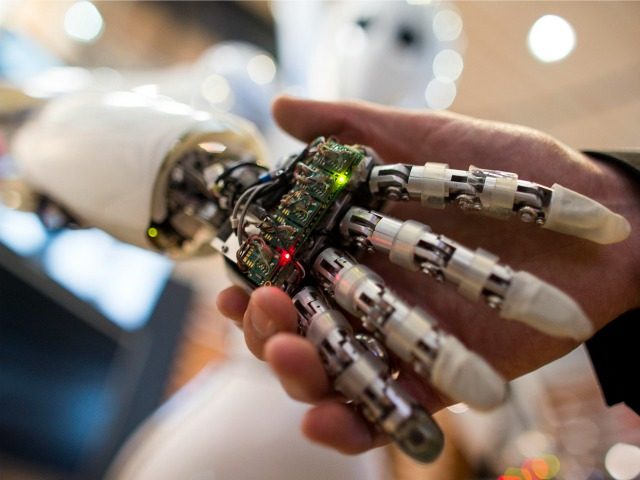Artificially intelligent machines may very well come to augment every aspect of our lives, and even extend them. But these advances raise a multitude of questions.
Evidence presented to UK Parliament’s House of Lords Artificial Intelligence Committee by IBM Hursley Innovation Centre Senior Inventor John McNamara suggests that within decades, we could be controlling our homes with all the effort of a thought, or eliminating cancer by rebooting our own cells with microscopic robots. In fact, McNamara suggests that within just 20 years, we will have effectively “melded” with the machines that have already come to augment virtually every aspect of our daily lives.
He theorized that humanity would see nanomachines “being injected into our bodies” in order to provide “huge medical benefits.” These benefits could allow us to repair cellular damage, restore muscle and bone, perhaps even so far as to augment their natural qualities with artificial precision. But that isn’t all, according to the inventor:
Beyond this, utilising technology which is already being explored today we see the creation of technology that can meld the biological with the technological, and so be able to enhance human cognitive capability directly, potentially offering greatly improved mental, as well as being able to utilise vast quantities of computing power to augment our own thought processes. Using this technology, embedded in ourselves and in our surroundings, we will begin to be able to control our environment with thought and gestures alone.
McNamara also speculated on “political avatars” that would sift through the vast amounts of available data on candidates, providing individual voting recommendations based on the voter’s own priorities and beliefs.
And while this is all well and good — and potentially very convenient — these predictions do not come without their warnings. According to University of Sheffield’s Emeritus Professor of AI and Robotics Noel Sharkey, that same convenience could become technology’s biggest liabiity. He worries that “by ceding decisions or control to machines,” we will “start accepting their decisions as correct or better than [our] own,” and quite simply “stop paying attention.”
Even if the languor does not atrophy our capacity to think for ourselves, even artificial intelligence is capable of being wrong; first and foremost, because we are the creators. Sharkey observes that “there is a growing body of evidence that the learning machine decision makers are inheriting many invisible biases among their correlations.”
In a world where a robot tells you how to vote, that could be a pretty big deal. The internal bias of a machine created by an individual with a different agenda may not consider information in a neutral manner, purely because its creator does not. How will we know whether an AI is functionally objective, and would we even accept one that didn’t simply validate our most comfortable beliefs?
In a robot-controlled world, those answers could have life-altering ramifications. In a world where they are subject to financial influence, those ramifications could quite literally change the face of the human race. McNamara crystallized that concern, cautioning:
Whereas today, being poor means being unable to afford the latest smart phone, tomorrow this could mean the difference between one group of people potentially having an extraordinary uplift in physical ability, cognitive ability, health, life span and another much wider group that do not.
According to these and many more of the world’s most intelligent minds, these or similar technological advancements are virtually inevitable. There will be no avoiding the future, and railing against the advent of technology that will expand the bounds of human life will prove to be, at best, short-sighted. What matters is no longer whether we will take hold of the possibilities, but how. We stand on the threshold of a defining age in the development of our species.
We must find these answers, convenient or not.
Follow Nate Church @Get2Church on Twitter for the latest news in gaming and technology, and snarky opinions on both.

COMMENTS
Please let us know if you're having issues with commenting.